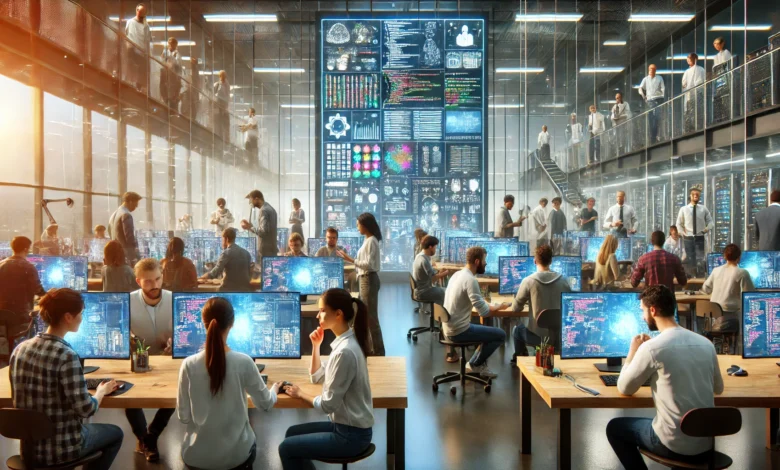Famous Computer Engineers Who Changed the World: The Brilliant Minds Behind Modern Technology

In today’s digital world, we owe much of our convenience and innovation to the brilliance of Famous Computer Engineers who shaped how we live, work, and connect. These are the people who turned abstract ideas into the devices, systems, and software that power modern life. From the pioneers of early computing to today’s visionaries behind artificial intelligence and global networking, Famous Computer Engineers have played a crucial role in building the foundations of our digital age.
Let’s take a deep dive into some of the most famous computer engineers who have left a permanent mark on history — and explore how their work continues to influence the future of technology.
1. Alan Turing – The Father of Computer Science
Alan Turing is often called the “father of modern computing,” Famous Computer Engineers and for good reason. His groundbreaking ideas in the early 20th century laid the foundation for everything we understand about computers today.
Turing’s concept of the Turing Machine, introduced in 1936, was revolutionary. It was a simple, theoretical device that could simulate any computational process. This idea became the basis for modern computer architecture and software development. His work proved that machines could perform logical operations and process information systematically — ideas that inspired the creation of digital computers decades later.
Beyond his academic brilliance, Turing played a key role during World War II by developing methods to crack the German Enigma code. His efforts saved countless lives and shortened the war. Sadly, his genius was underappreciated during his lifetime, but today, Turing’s name is honored worldwide in awards, films, and institutions celebrating computer science.
2. Grace Hopper – The Queen of Software

When we talk about the evolution of Famous Computer Engineers programming, Grace Hopper’s name stands tall. A U.S. Navy Rear Admiral and computer scientist, Hopper was one of the first programmers of the Harvard Mark I computer and later developed the first compiler — a tool that translates human-readable code into machine language.
Her groundbreaking work made it possible for computers to be programmed using simple English commands rather than complex binary or assembly code. This innovation led to the creation of COBOL (Common Business-Oriented Language), one of the first high-level programming languages, which became the backbone of early business computing systems.
Hopper’s influence extended beyond her technical contributions. She was also a passionate educator and advocate for women in technology, encouraging countless young people to pursue careers in computing. Her playful spirit and curiosity gave rise to the term “Famous Computer Engineers bug” after she found an actual moth causing a malfunction inside a computer.
3. Steve Wozniak – The Creative Engineer Behind Apple
Few names in computer engineering are as recognizable as Steve Wozniak, co-founder of Apple Inc. Alongside Steve Jobs, Wozniak revolutionized personal computing by designing and building the Apple I and Apple II Famous Computer Engineers in the 1970s.
Unlike many of his contemporaries, Wozniak was not just a visionary — he was a true engineer at heart. He designed the Apple I entirely by himself, including the circuit board, hardware, and operating system. His goal was to make computing accessible and affordable to everyone, not just scientists or large corporations. The Apple II became one of the first mass-produced personal computers, setting a new standard for design and functionality.
Wozniak’s creative approach to problem-solving and his passion for elegant engineering solutions continue to inspire generations of innovators. Even after leaving Apple, he has remained a strong advocate for education and innovation, proving that true engineers never stop tinkering with ideas.
4. Tim Berners-Lee – The Engineer Who Invented the Web
Imagine a world without the internet — no Google, no social media, no online shopping. That world existed until Tim Berners-Lee, a British Famous Computer Engineers, invented the World Wide Web in 1989.
Working at CERN, Berners-Lee envisioned a system where researchers could easily share information using interconnected documents. His invention combined three key technologies — HTML (Hypertext Markup Language), HTTP (Hypertext Transfer Protocol), and URL (Uniform Resource Locator) — creating the structure of the web as we know it. The result was a global communication system that forever changed how humans share information.
Today, Berners-Lee continues to advocate for an open and decentralized internet, promoting digital freedom and privacy. His invention transformed computer engineering from a technical field into a universal platform for knowledge, communication, and creativity — making him one of the most influential engineers of all time.
5. Linus Torvalds – The Power of Open Source
When it comes to open-source software, Linus Torvalds is a name that commands respect. As the creator of the Linux operating system, Torvalds introduced a new era of collaboration and transparency in Famous Computer Engineers engineering.
In 1991, while still a student in Finland, he began developing a free, open-source operating system kernel that anyone could modify and improve. What started as a small project soon exploded into a global movement. Today, Linux powers everything from smartphones and Famous Computer Engineers to web servers and space systems.
Torvalds’ contribution goes beyond technical innovation — he demonstrated how community-driven engineering can outpace corporate monopolies. His work inspired the open-source revolution, leading to countless software frameworks and tools that define modern computing. The Linux philosophy — sharing, improvement, and freedom — remains one of the most powerful legacies in the digital world.
6. Margaret Hamilton – The Software Engineer Who Took Us to the Moon
Before software engineering was even recognized as a profession, Margaret Hamilton was already writing code that made history. As the lead software engineer for NASA’s Apollo Program, she developed the onboard flight software that guided Apollo 11 to the moon in 1969.
Hamilton’s meticulous coding ensured the spacecraft could handle unexpected errors during landing — a moment that nearly caused mission failure but was saved by her intelligent programming. Her approach to error detection and recovery became the foundation of reliable software design, proving how critical engineering precision can be.
Beyond her technical achievements, Hamilton fought for recognition of software engineering as a legitimate discipline. Her pioneering spirit and leadership have inspired generations of engineers to approach coding not just as a technical skill, but as an art form that demands creativity, logic, and foresight.
7. Elon Musk – The Visionary Engineer Redefining the Future
While often known as a billionaire entrepreneur, Elon Musk is also a Famous Computer Engineers at heart. His early ventures, like Zip2 and X.com (which became PayPal), were deeply rooted in computer software and network engineering.
Musk’s understanding of systems and computing has guided his ventures in Tesla, SpaceX, and Neuralink, where software engineering plays a critical role in automation, AI, and machine learning. He envisions a world where computers and humans collaborate seamlessly — from autonomous vehicles to brain-computer interfaces.
What sets Musk apart is his fearless pursuit of innovation. He constantly challenges conventional limits of engineering, showing that Famous Computer Engineers science is not just about code — it’s about changing how humanity interacts with technology.
8. Mark Dean – The Hidden Genius Behind the PC
Many people don’t realize that Mark Dean, an African-American computer engineer, was instrumental in developing the personal Famous Computer Engineers as we know it. As one of IBM’s top engineers, Dean co-invented the IBM PC and helped design several crucial technologies, including the ISA bus that allowed computers to use plug-in devices like printers and modems.
Dean also led the team that created the first gigahertz microprocessor, which drastically increased computing speed and performance. His work proved that diversity drives innovation — and that great engineering is about solving real-world problems that improve people’s lives.
Today, Dean continues to advocate for education, creativity, and inclusion in technology. His contributions serve as a reminder that some of the most powerful innovations come from the minds we least expect.
Conclusion: The Legacy of Computer Engineers
From the analytical brilliance of Alan Turing to the innovative spirit of Steve Wozniak and the visionary leadership of Elon Musk, Famous Computer Engineers have done far more than just build machines — they have shaped modern civilization. Their creativity, discipline, and willingness to explore the unknown continue to inspire new generations of coders, builders, and dreamers.
Every app, every smart device, every digital breakthrough is a continuation of their legacy. The story of famous computer engineers isn’t just a story of technology — it’s a story of human imagination, perseverance, and progress.



